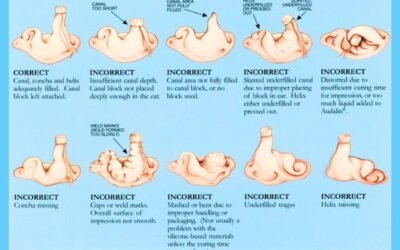Causes of Speech and Language Disorders: Speech and language disorders stem from a wide array of factors, ranging from genetic predispositions to environmental influences. Some individuals may face challenges due to neurological conditions, while others may experience speech muscle weaknesses affecting articulation. Let’s delve into some of the most common causes of speech and language disorders:
- Genetic Factors: Family history and specific genetic mutations can play a significant role in speech and language disorders. In some cases, certain disorders may run in families, suggesting a hereditary component. Additionally, mutations in specific genes related to speech and language can lead to communication difficulties.
- Environmental Factors: Prenatal, perinatal, and postnatal influences can impact speech and language development. Experiences during pregnancy, complications during birth, and early-life exposure to toxins or infections can contribute to these disorders.
- Neurological Causes: Brain abnormalities and neurodevelopmental disorders can disrupt the neural pathways responsible for language processing. Conditions like cerebral palsy, autism spectrum disorder, and intellectual disabilities fall under this category.
- Hearing Loss and Auditory Issues: Conditions like conductive hearing loss, sensorineural hearing loss, and auditory processing disorders can impede the ability to perceive and produce speech sounds accurately.
- Speech Muscle Weakness: Dysarthria and oral motor deficits can affect the coordination of speech muscles, leading to difficulties in articulation and speech clarity.
- Developmental Language Disorders: Expressive and receptive language disorders may arise due to challenges in understanding and using language appropriately.
- Autism Spectrum Disorder (ASD): Individuals on the autism spectrum often experience communication challenges, including difficulties with language pragmatics and social communication.
- Traumatic Brain Injuries (TBI): Brain injuries caused by accidents or trauma can impact speech and language functions, depending on the area of the brain affected.
- Stroke and Aphasia: Strokes can lead to various types of aphasia, affecting language comprehension and expression.
- Intellectual Disabilities: Individuals with intellectual disabilities may encounter delays and difficulties in language development.
Causes of Delayed Speech
Identifying the causes of delayed speech is crucial for early intervention and providing the necessary support to children facing speech delays. Understanding these factors empowers parents, caregivers, and educators to take appropriate actions to help children overcome speech challenges and enhance their communication skills. Early diagnosis and intervention can make a significant difference in a child’s speech development journey, setting them on a path to successful communication and social interaction.
- Language Development Delays: Language development delays can be attributed to a variety of factors, including genetic predisposition, environmental influences, and neurological conditions. Children with language development delays may struggle with speech sounds, grammar, and vocabulary, making it challenging for them to express themselves effectively.
- Hearing Impairment: Hearing impairment is a significant factor that can lead to delayed speech in children. When a child has difficulty hearing or is completely deaf, they may not be able to perceive speech sounds properly, hindering their ability to imitate and learn language effectively.
- Intellectual Disabilities: Intellectual disabilities can impact a child’s cognitive abilities, including language processing skills. Children with intellectual disabilities may find it challenging to understand and use language appropriately, resulting in delayed speech.
- Lack of Stimulation and Interaction: A nurturing and stimulating environment is essential for a child’s speech development. Lack of interaction and limited exposure to language-rich environments may hinder a child’s ability to acquire language skills on par with their peers.
- Bilingualism: While being bilingual can have numerous cognitive benefits, it can also cause temporary speech delays in some children. This phenomenon, known as “transitional bilingualism,” occurs as the child learns to distinguish between two languages and becomes fluent in both over time.
- Oral-Motor Problems: Oral-motor problems involve difficulties with the muscles used for speech and eating. Children with oral-motor issues may struggle to articulate certain speech sounds, leading to delayed speech development.
- Emotional and Psychological Factors: Psychological and emotional well-being play a crucial role in speech development. Children experiencing emotional stress, trauma, or anxiety may exhibit delayed speech as a result of their emotional challenges.
- Premature Birth: Premature birth can be linked to speech delays due to the potential neurological impact of early birth. Premature babies may require more time to develop their speech and language skills compared to full-term babies.
- Auditory Processing Disorders: Auditory processing disorders affect the brain’s ability to interpret sounds, even when hearing is normal. This can make it challenging for a child to understand and process spoken language, leading to speech delays.
- Specific Language Impairment: Specific Language Impairment (SLI) is a language disorder that affects the development of language skills without any apparent cause. Children with SLI may struggle with grammar, vocabulary, and understanding complex sentences, contributing to delayed speech.
Causes of Language Disorders
Understanding the causes of language disorders is essential for providing effective support and intervention to affected individuals. Genetic factors, environmental influences, neurological conditions, and various other factors contribute to language disorders. Early identification and targeted therapies can help individuals overcome language challenges and improve their communication skills. By promoting awareness and adopting a holistic approach, we can create a more inclusive and supportive environment for individuals with language disorders.
Genetic Factors and Language Disorders
Many language disorders have a genetic component. Certain genetic mutations or variations can influence how the brain processes language. Genetic conditions like Down syndrome and Fragile X syndrome are associated with a higher risk of language disorders. Researchers are continuously studying the genetic basis of language disorders to better understand their origins and develop targeted interventions.
Environmental Influences on Language Development
Apart from genetic factors, a child’s environment plays a vital role in language development. Early exposure to language and a stimulating linguistic environment are crucial for language acquisition. Children who grow up in language-rich households tend to have better language skills. On the other hand, environmental deprivation, such as limited exposure to language, can hinder language development and lead to language disorders.
Neurological Causes of Language Disorders
The brain’s intricate neural networks govern language processing. Damage or abnormalities in specific brain areas can result in language disorders. Conditions like aphasia, which affects language production and comprehension, are often caused by strokes or brain injuries. Understanding the neurological basis of language disorders can guide targeted therapies and rehabilitation approaches.
Bilingualism and Language Disorders
There is a common misconception that exposing a child to multiple languages might cause language disorders. On the contrary, research suggests that bilingualism can have cognitive and linguistic benefits. Bilingual individuals often display enhanced executive functions and flexibility in language use. Language disorders can occur in monolingual and bilingual individuals alike, and bilingualism itself is not a cause of language disorders.
Auditory Processing Disorder (APD) and Language Disorders
Auditory Processing Disorder (APD) is a condition where the brain has difficulty processing sounds. While APD primarily affects auditory processing, it can have an impact on language development as well. Children with APD may struggle to understand spoken language, leading to language delays and challenges. Early diagnosis and targeted interventions can help manage APD and its effects on language development.
Social and Cultural Factors in Language Development
Language development is influenced by social and cultural factors. Children learn language by interacting with their caregivers and peers. In some cultures, certain language patterns or dialects might be more prevalent, leading to variations in language development. Understanding the cultural context is crucial when assessing language skills and providing support to individuals from diverse backgrounds.
Specific Language Impairment (SLI)
Specific Language Impairment (SLI) is a language disorder that affects the development of language skills without any other underlying developmental issues. Children with SLI may struggle with grammar, vocabulary, and sentence structure. Early identification and intervention are essential to help children with SLI overcome their language challenges.
Intellectual Disabilities and Language Disorders
Intellectual disabilities can impact various areas of development, including language skills. Children with intellectual disabilities might experience delays in language acquisition and struggle to express themselves effectively. Tailored educational and therapeutic interventions can support language development and communication for individuals with intellectual disabilities.
Autism Spectrum Disorder (ASD) and Language Difficulties
Language difficulties are common in individuals with Autism Spectrum Disorder (ASD). Some children with ASD may have delayed language development or face challenges in using language for social communication. Speech and language therapy, along with specialized interventions, can help individuals with ASD improve their communication skills.
Language Disorders in Adulthood
Language disorders are not limited to childhood; they can also arise in adulthood. Brain injuries, strokes, or degenerative neurological conditions can lead to acquired language disorders. Rehabilitation and speech therapy are essential components of the treatment process for adults with language disorders.
Language Disorders in Multilingual Communities
In communities with multiple languages spoken, language disorders can present unique challenges. Identifying language disorders in multilingual individuals requires expertise in language assessment and an understanding of language dynamics within the community.
Environmental Toxins and Language Development
Exposure to environmental toxins during pregnancy or early childhood can have detrimental effects on language development. Certain chemicals or pollutants can disrupt neurological development and increase the risk of language disorders. It is essential to minimize exposure to environmental toxins to support healthy language development.
Learning Disabilities and Language Challenges
Language disorders can co-occur with learning disabilities, making it more complex to identify and address the underlying issues. Children with learning disabilities might struggle with reading, writing, and other academic skills, further impacting their language development.
Emotional and Psychological Factors in Language Development
Emotional and psychological well-being can influence language development. Children experiencing emotional trauma or adverse life events may have language difficulties as a result. A holistic approach to intervention that considers emotional well-being is crucial for supporting language development.
Hearing Loss and Language Development
Hearing loss can significantly impact language development, especially if it occurs during critical periods of language acquisition. Early diagnosis of hearing loss and appropriate interventions, such as hearing aids or cochlear implants, can support language development in children with hearing impairments.
Parental Interaction and Language Skills
Parent-child interaction plays a central role in language development. Engaging in meaningful conversations with children and providing a supportive linguistic environment can enhance language skills and reduce the risk of language disorders.
Brain Plasticity and Language Recovery
The brain’s ability to reorganize and adapt, known as neuroplasticity, plays a crucial role in language recovery after injuries or disorders. Understanding the mechanisms of brain plasticity can inform therapeutic approaches to promote language rehabilitation.
Gender Differences in Language Disorders
Research suggests that there may be gender differences in the prevalence and manifestation of language disorders. Understanding these differences can improve the accuracy of diagnosis and the effectiveness of interventions.
Cultural Perspectives on Language Disorders
Different cultures may have varying perspectives on language disorders, affecting how they are perceived and addressed. Raising awareness and promoting culturally sensitive practices can improve outcomes for individuals with language disorders.
Language Disorders and Academic Achievement
Language disorders can impact academic achievement and hinder progress in various subjects. Identifying and addressing language challenges early can help students succeed in their educational journey.
Socioeconomic Factors and Language Development
Socioeconomic factors can influence language development. Children from disadvantaged backgrounds may face additional barriers to language acquisition, highlighting the importance of equitable access to language support and intervention.
Causes of Communication Disorders
The causes of communication disorders are crucial in providing effective support and interventions for individuals experiencing challenges in speech and language. From genetic predisposition to environmental and psychological factors, the root causes of communication disorders are diverse and multifaceted
Causes |
|
|
|
|
|
|
|
|
|
|
|
|
|
|
|
|
|
|
|
|
|
|
|
|
|
References:
- Treatment Resource Manual for speech-language pathology 5th edition Froma P. Roth, colleen K. wor [Book]
- Clinical Methods and Practicum in Speech-Language Pathology M. N. Hegde, Ph. D.Deborah Davis, M.A [Book]
- Assessment in Speech Language Pathology A Resource Manual 5th Edition, Kenneth G. Shipley, Julie G. McAfee [Book]
- Introduction to communication sciences and disorders – Gary Weismer, David K. Brown [Book]
You are reading about:
Causes of Speech and Language disorders




0 Comments